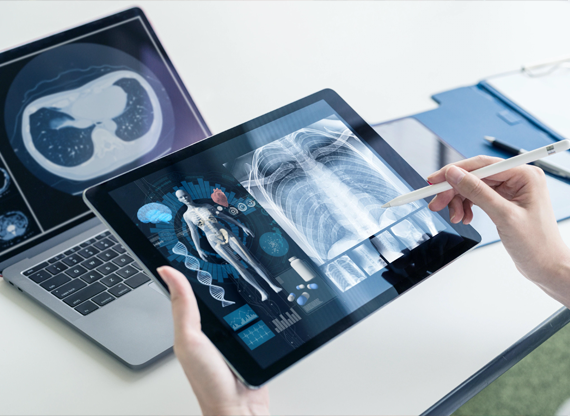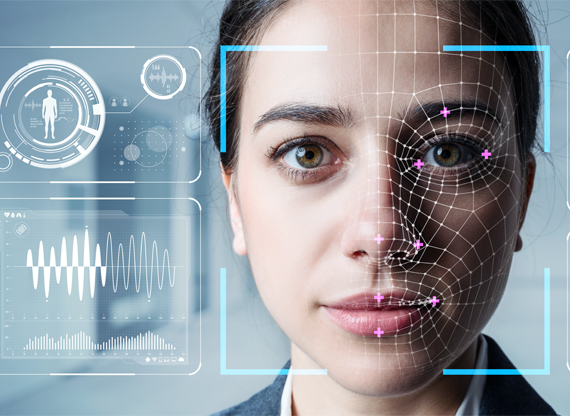July 19, 2021
Digital Biomarkers for Cancer Care Across the Healthcare Continuum
As digital health tools increase in adoption and health-related apps take over app stores, the need to harness the power of digital biomarkers for cancer treatment and prevention doesn’t seem so out of reach anymore.
Once upon a time, the idea of individually tailoring any sort of healthcare treatment - let alone one for cancer - was the type of thing you’d see in futuristic movies. Personalized drugs and super-intelligent digital health tech sounded like make-believe, and cancer patients went through diagnoses and treatments hoping for the best.
But as the digital health tech space has evolved, so, too, has the real-world capability of digital biomarkers for cancer research and treatment. So not only are we getting to a place where we can better diagnose and treat cancer, we’re getting to a place where we can predict and tailor medicine with never seen before precision.
Digital Biomarkers - Not a Futuristic Imagination Anymore
The mass adoption of digital devices has essentially evaporated any boundaries to accessing reliable patient data - in a clinical setting or even at home. With more digital devices come more health-related apps, and with more apps come gold mines of digital biomarker data even in the largest and most diverse populations and environments.
Access to patient data has ranged from just tracking basic vital signs and lab results to real-time monitoring and even predictive indicators. Complex data is now more easily aggregated and understood both outside and inside clinical settings, with digital biomarkers informing everything from preventative screening to R&D to patient treatment in real-time. Digital biomarkers are no longer vanity metrics from a fitness tracker or a snapshot of a patient’s physical presence in a hospital or doctor’s office when they’re simply ill or being studied. Instead, these data points are becoming potential leading indicators that healthcare practitioners and academics can reliably lean on across the clinical continuum.
The Rise of Digital Biomarkers for Cancer
For a specialty like oncology, digital biomarkers crack open the ability to assess susceptibility and custom tailor pharmacodynamic responses - the sci-fi dreams come to life.
The application of digital biomarkers for cancer prevention and treatment are now seamlessly part of all stages, from research to drug development to healthcare interventions. For example, digital biomarkers monitor temperature, blood pressure, heart rate, temperature, respiration, and oxygen levels, as well as factors like skin conductance, mobility, posture, and sleep.
Gathering sophisticated data - and doing so securely - allows healthcare providers to uncover a patients’ genetic makeup and risk factors and tailor precision drug treatments and dosing to the individual case. As a result, prescribing as we know it has evolved from simply signing a script or administering a dose and waiting to see results into a potentially real-time iteration that can actively track and adjust based on how a patient responds to treatment.
This gives more agency to the patient or study subject, potentially playing a bigger role in shifting healthcare culture by empowering them in their own care and advocacy.
Early Detection and Risk Monitoring
The implications of digital biomarkers for cancer care aren’t just life-changing for the diagnosed patient - the ability to tap into this individualized data has incredible potential for disease prevention. Thanks to early detection and monitoring that can be tailored to the individual’s risk factors and genetic predispositions, the fight against cancer can shift future-looking.
And as we enhance the data and knowledge, we have of cancer progression, the healthcare sector’s ability to identify specific patient sub-groups or public health trends makes digital biomarkers for cancer unbelievably comprehensive. This data becomes a way to improve the quality of life for patients and potential patients alike. As a result, cancer prevention becomes something realistic and tangible - even predictive - and not a hopeful outcome of an annual mammogram or prostate exam. The potential to reach underserved populations and improve care and innovation through digital health tech and the use of digital biomarkers becomes a mission of civic good, too - of better health for all.
The use and innovation in digital biomarkers for cancer are defining how we look at health and disease entirely. As the digital health tech community integrates new data types to reimagine cancer research and treatment, the real-time feedback of response and effectiveness puts us one giant step closer to one day eradicating cancer.






